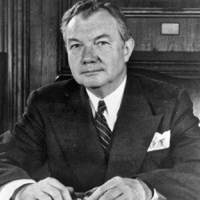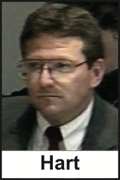Rascals case in brief
In the beginning, in 1989, more than 90 children at the Little Rascals Day Care Center in Edenton, North Carolina, accused a total of 20 adults with 429 instances of sexual abuse over a three-year period. It may have all begun with one parent’s complaint about punishment given her child.
Among the alleged perpetrators: the sheriff and mayor. But prosecutors would charge only Robin Byrum, Darlene Harris, Elizabeth “Betsy” Kelly, Robert “Bob” Kelly, Willard Scott Privott, Shelley Stone and Dawn Wilson – the Edenton 7.
Along with sodomy and beatings, allegations included a baby killed with a handgun, a child being hung upside down from a tree and being set on fire and countless other fantastic incidents involving spaceships, hot air balloons, pirate ships and trained sharks.
By the time prosecutors dropped the last charges in 1997, Little Rascals had become North Carolina’s longest and most costly criminal trial. Prosecutors kept defendants jailed in hopes at least one would turn against their supposed co-conspirators. Remarkably, none did. Another shameful record: Five defendants had to wait longer to face their accusers in court than anyone else in North Carolina history.
Between 1991 and 1997, Ofra Bikel produced three extraordinary episodes on the Little Rascals case for the PBS series “Frontline.” Although “Innocence Lost” did not deter prosecutors, it exposed their tactics and fostered nationwide skepticism and dismay.
With each passing year, the absurdity of the Little Rascals charges has become more obvious. But no admission of error has ever come from prosecutors, police, interviewers or parents. This site is devoted to the issues raised by this case.
On Facebook
Click for earlier Facebook posts archived on this site
Click to go to
Today’s random selection from the Little Rascals Day Care archives….
Click for earlier Facebook posts archived on this site
Click to go to
Today’s random selection from the Little Rascals Day Care archives….
‘For historians… a taste of what it was like to live in Salem’
June 21, 2013
From blog commenter Mike:
“I’d seen the ‘Frontline’ episodes long ago, before I moved to North Carolina. I was surprised to learn, when I recently revisited the case, that this travesty happened in a state I love.
“For historians who might want to get a taste of what it was like to live in Salem in the late 17th century (or, to invoke a less well-known era, Germany of the 15th century), this staggering case would serve them well…. The unrepentant prosecutors, ignorant ‘therapists’ and others who ruined the lives of the defendants must not be allowed to be forgotten.”
Mike’s reference to the infamous Malleus Maleficarum, published in 1484 by two German friars to squelch skepticism about the existence of witchcraft, is painfully apt. Just substitute “satanic ritual abuse” for “witchcraft,” and – poof! – up in smoke go five centuries of the ascent of man.
‘Tremendous … discretion’ has changed little since 1940

wikipedia.com
Robert H. Jackson
July 19, 2016
“The prosecutor has more control over life, liberty, and reputation than any other person in America. His discretion is tremendous. He can have citizens investigated and, if he is that kind of person, he can have this done to the tune of public statements and veiled or unveiled intimations.
“Or the prosecutor may choose a more subtle course and simply have a citizen’s friends interviewed. The prosecutor can order arrests, present cases to the grand jury in secret session, and on the basis of his one-sided presentation of the facts, can cause the citizen to be indicted and held for trial. He may dismiss the case before trial, in which case the defense never has a chance to be heard.
“Or he may go on with a public trial. If he obtains a conviction, the prosecutor can still make recommendations as to sentence, as to whether the prisoner should get probation or a suspended sentence, and after he is put away, as to whether he is a fit subject for parole.
“While the prosecutor at his best is one of the most beneficent forces in our society, when he acts from malice or other base motives, he is one of the worst….”
– From an address by Attorney General Robert H. Jackson to the Conference of United States Attorneys, Washington, D.C., April 1, 1940
Although Jackson’s cautionary words were directed toward federal prosecutors, they could hardly be more applicable to the State of North Carolina’s prosecution of the Edenton Seven. H.P. Williams Jr., Bill Hart and Nancy Lamb surely missed no chance to put forth “veiled or unveiled intimations,” to make a “one-sided presentation” or to otherwise act “from malice or other base motives.”
![]()
How Bill Hart got better at playing dirty
Dec. 2, 2011
 “Videotaped interviews made during the early cases (alleging day care ritual sex abuse) show that when children were allowed to speak freely, either they had nothing to say about abuse or they denied it ever happened to them.
“Videotaped interviews made during the early cases (alleging day care ritual sex abuse) show that when children were allowed to speak freely, either they had nothing to say about abuse or they denied it ever happened to them.
“Once it became obvious that these records would prevent guilty verdicts, prosecutors began advising investigators not to keep tapes or detailed notes of their work.”
– From “Satan’s Silence: Ritual Abuse and the Making of a Modern American Witch Hunt” by Debbie Nathan and Michael Snedeker (1995)
Perhaps the most significant difference in the two largest abuse trials was that McMartin defense attorneys were able to expose to jurors the prosecution therapists’ manipulative interview techniques, while Little Rascals attorneys were stymied by the premeditated unavailability of original documentation.
“After Bob Kelly’s indictment,” according to an article in the ABA Journal, “Bill Hart, a North Carolina deputy attorney general assigned to the case, traveled to Los Angeles to consult with McMartin prosecutors.
“He learned that McMartin jurors had criticized videotapes of therapist Kee McFarlane’s interviews with the children. She asked leading questions and rebuked children who did not tell of abuse….”
Hart could have brought back to North Carolina the lesson that interviewers shouldn’t “(ask) leading questions and (rebuke) children who did not tell of abuse.” Instead, he brought back the lesson that interviewers should leave no evidence of having used exactly those fraudulent techniques.
When will wheels of justice turn for Junior?
Sept. 23, 2013
There’s a bit of an update out of Raleigh on Junior Chandler’s prospects for clemency.
Billy Chandler, Junior’s brother, received this email last week from Pat Hansen in the Governor’s Clemency Office:
“Attorney Mark Montgomery filed a commutation request with this office at the end of Governor Perdue’s term in office. However, due to the volume of requests received, the request was not ‘officially reopened.’ Currently, we are working on all of the cases held over from the Perdue Administration. Unfortunately, I cannot tell you when your brother’s case will be reviewed.”
In North Carolina the governor’s clemency power covers both pardons and commutations. Here’s the stated distinction:
“Commutation – whereby an individual presently incarcerated and serving an active sentence has their sentence commuted or reduced by any number of years, months, or days, or to make parole eligible, or to time served which would release the individual immediately.
“Pardon – may be granted to those individuals who have maintained a good reputation in their community, following the completion of their sentence for a criminal offense. Ordinarily, an applicant must wait to apply until at least five years have elapsed since the applicant was released from State supervision (including probation or parole). A Pardon is merely an official statement attached to the criminal record that states that the State of North Carolina has pardoned the crime. A Pardon does not expunge or erase a criminal record….”
As much as the facts of Junior’s case call for a pardon, a commutation seems not quite as steep a challenge. However great “the volume of requests received,” Junior Chandler’s surely deserves to be at the top of the stack.











0 CommentsComment on Facebook